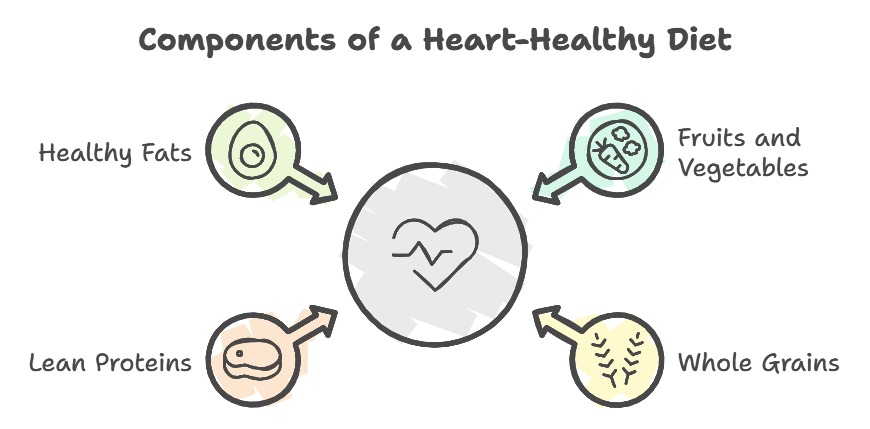Maintaining good cardio health is important, impacting our overall well-being and longevity. This goes beyond simply hitting the gym.
A deeper understanding of cardio health encompasses lifestyle choices, understanding risks, and making proactive changes to protect your heart. In this comprehensive guide, we will explore the essential components of cardio health.
We will offer actionable insights to empower you on your journey to a healthier heart.
Understanding Cardio Health Benefit
Cardio health, or cardiovascular health, refers to the health of your heart and blood vessels. This crucial system ensures that blood circulates properly throughout your body, delivering oxygen and essential nutrients.
When cardio health is compromised, the risk of heart disease, stroke, and other serious conditions increases. Taking care of this vital aspect of our well-being is paramount for a healthier and longer life.
Why is Cardio Health So Important?
A healthy heart is central to a good life. It pumps blood effectively, supplying oxygen and nutrients to your organs and tissues, which keeps everything functioning at its best.
Strong cardio health not only helps us maintain physical energy for daily tasks and cardio exercise, but also plays a crucial role in mental acuity.
This is achieved by supporting healthy blood flow to the brain. By understanding and prioritizing cardio health, we set a solid foundation for a vibrantly healthy life.
If you’re looking to take a step towards enhancing your cardio, try incorporating high-intensity interval training (HIIT) into your routine. Discover how HIIT bodyweight workouts can help you get fit and boost your heart health today.
What Affects Cardio Health?
Numerous factors influence your cardio health. Some factors are within our control, and others less so. Age, for example, is an unavoidable factor.
The risk for heart disease naturally increases as we get older. Genetics also plays a significant role. Your family history of heart conditions is a key factor to consider.
However, lifestyle choices present powerful opportunities to bolster your cardio health, regardless of genetics or age. Smoking is widely recognized as one of the most damaging factors, severely increasing the risk of heart problems1.
Diet plays a huge role too. Diets high in saturated fats, trans fats, cholesterol, and sodium contribute to unhealthy cholesterol levels and high blood pressure.
Lack of physical activity can weaken your heart muscle, while obesity puts additional strain on it. It’s critical to prioritize healthy habits to counteract any potential genetic predisposition to heart disease.
Key Components of Cardio Health
A holistic approach to cardio health focuses on these essential aspects. It provides a clear roadmap to heart wellness. Understanding the science behind these factors allows us to make informed choices. In turn, we can empower ourselves on our journey to good health.
Physical Activity and Cardio
The Physical Activity Guidelines for Americans2 published by the U.S. Department of Health & Human Services emphasizes the profound positive impact exercise has on your cardio health.
Aim for a minimum of 150 minutes of moderate-intensity aerobic exercise or 75 minutes of vigorous-intensity cardio exercise each week.
If you’re just starting out, remember that even small steps make a difference. Participating in patient care can even count as physical activity, as long as it involves movement and elevates your heart rate.
A study published in April of 2018 and sponsored by the National Institutes of Health3 reinforces the link between cardio exercise and improved cardio health.
“Regular physical activity is one of the most important things you can do for your health.”
Center for Disease Control and Prevention (CDC)
Participants who consistently engaged in physical activity showed notable enhancements in their heart’s overall efficiency. Their target heart rates were achieved more easily, indicating improved cardiovascular fitness.
What Are Some Examples of Cardio Activities?
Regular exercises that increase your heart rate, prevent heart failure and breathing for a sustained period benefit your heart. The American Heart Association4 has suggestions that fit a variety of preferences:
- Brisk walking
- Jogging or running
- Swimming
- Cycling
- Dancing
- Jumping rope
- Hiking
The beauty of cardio lies in its adaptability; choose activities you genuinely enjoy to establish a sustainable and rewarding fitness routine.
Don’t be afraid to explore different types of exercise and find what works best for you. Whether it’s joining a dance class, going for a hike in nature, or simply taking a brisk walk in your neighborhood, there are plenty of ways to make cardio enjoyable and a regular part of your life that leads to healthy weight and your overall health. Remember, every little bit counts.
Understanding and Managing Blood Pressure
Blood pressure refers to the force of your blood pushing against the walls of your arteries. Think of your arteries as highways for blood flow. When pressure increases, these highways strain, like rush hour traffic jams.
Over time, high blood pressure can damage artery walls. This raises the risk of heart attack, heart disease, and stroke. Conversely, lower blood pressure generally means a healthier heart and lower risk.
Blood pressure has two readings: Systolic (top) and Diastolic (bottom), both in mmHg. The American Heart Association defines normal as below 120/80 mmHg5.
Readings above this need monitoring and may require lifestyle changes. High blood pressure, or “silent killer,” often shows no symptoms. Therefore, regular checks by a healthcare professional are crucial.
Cholesterol Level: A Key Player
Cholesterol level is a fatty substance crucial for several bodily functions, including cell membrane formation. While we need cholesterol, maintaining healthy levels is key. High cholesterol can accumulate in your arteries, restricting blood flow.
It acts much like a buildup of plaque in a pipe, narrowing the pathway and hindering normal flow. Imagine it as cholesterol “traffic” in your arteries. This buildup increases the risk of heart attacks and strokes.
What Are Healthy Cholesterol Levels?
A blood test can provide insights into your cholesterol levels and potential risk factors. Maintaining healthy cholesterol levels is an important part of cardiovascular health.
| Type of Cholesterol | Desirable Level |
|---|---|
| Total Cholesterol | Less than 200 mg/dL |
| LDL (Bad) Cholesterol | Less than 100 mg/dL (even lower is desirable for those at higher risk) |
| HDL (Good) Cholesterol | 60 mg/dL or higher is considered protective |
| Triglycerides | Less than 150 mg/dL |
It is advisable to consult with a healthcare provider to understand your cholesterol levels and discuss appropriate management strategies. They can provide personalized recommendations based on your individual risk factors and overall health status.
Heart Healthy Diet: Finding the Right Balance

What you consume has a major impact on your heart health. Aim to create healthy habits by choosing foods low in unhealthy fats and rich in essential nutrients.
The Mediterranean diet has been linked to improved heart health due to its emphasis on:
- Fruits and vegetables
- Whole grains
- Lean proteins
- Healthy fats, such as those found in olive oil, nuts, and fatty fish
A heart healthy diet isn’t about deprivation. It’s about making sustainable choices that nourish your body and support your heart.
Small changes can make a big difference over time. For example, swap sugary drinks for water. Choose whole grains, not refined ones. And, add more fruits and vegetables to your meals.
Taking care of your heart health doesn’t have to be overwhelming. Small steps, like maintaining a balanced diet and staying active, can make a big difference. But sometimes, even with our best efforts, it feels like we could use a little extra support.
Recently, I came across something online that caught my attention: Cardio Plus by Standard Process. It’s a cardio health supplement designed specifically to support cardiovascular health, and what stood out to me was how thoughtfully it’s made. Packed with whole food ingredients and essential nutrients, this cardio health supplement seems like a great option for anyone looking to give their heart a little boost.
If you’re curious, you can check Cardio Plus by Standard Process out here. It might be worth exploring as part of your wellness routine—it’s always nice to have a bit of extra support when it comes to something as important as heart health.
Frequently Asked Questions
What does cardio health mean?
Cardio health is a short way to say cardiovascular health. It refers to how well your heart and blood vessels are working. This system carries blood, oxygen, and vital nutrients throughout your body.
How can I improve my cardio health?
To boost cardio health, exercise regularly, eat a balanced diet, manage stress, and avoid smoking.
Also, manage chronic conditions like high blood pressure, high cholesterol, and diabetes. Regular check-ups with your provider can catch issues early and ensure proper management.
How much cardio is needed to stay healthy?
The American Heart Association recommends 150 minutes of moderate exercise, like brisk walking, or 75 minutes of vigorous exercise each week. If you’re not used to working out regularly, ease into it.
Start with shorter durations or less intensity. Gradually increase them as you build stamina. Remember, short bursts of activity can add up and be healthy.
What is cardiorespiratory health?
Cardiorespiratory health is about how well your heart and lungs work together.
They must efficiently supply oxygen to your body, especially during exercise. Good cardiorespiratory health is vital for well-being. It reduces the risk of chronic diseases.
Conclusion
Cardio health is more than just a measure of our physical well-being. It directly impacts our longevity, quality of life, and overall happiness. Embracing lifestyle modifications like a heart-healthy diet and consistent exercise are not quick fixes, but ongoing commitments.
Just as we prioritize other aspects of our lives, dedicating ourselves to a heart-healthy lifestyle should become second nature. It should be a non-negotiable part of a healthy and fulfilling future. By investing in our heart health, we choose life, vitality, and a future full of possibility.
Take five minutes today to assess your heart health habits. Consider one small change you can make this week to improve your cardio health, whether it’s a daily walk or a new exercise class.
Small Step, Big Impact
Start incorporating at least 30 minutes of moderate-intensity cardio exercises, such as brisk walking or cycling, into your daily routine to significantly improve your heart health.
Listen to this article
This is an AI generated Podcast version of the article.



